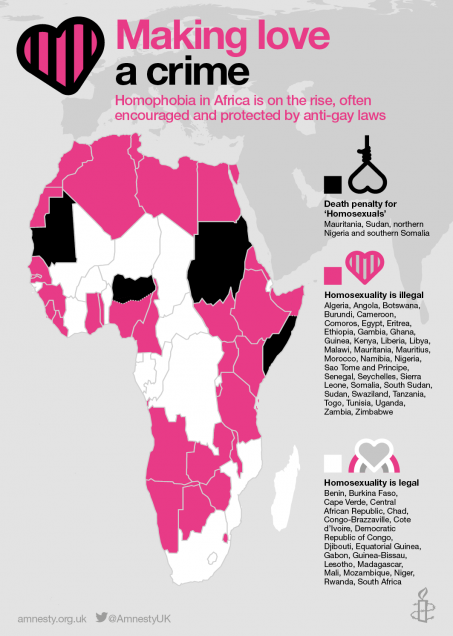By Rose Collins
The Movement to Repeal a Colonial-Era Sodomy Law in Namibia
Namibia, located in Southern Africa, is, in terms of public opinion, one of the most LGBTQ+ tolerant countries on the continent. However, sodomy is still criminalized under Roman-Dutch common law, discrimination of LGBTQ+ people is legal, and same-sex marriages are not recognized by the courts. While all of these issues work in tandem, right now, the greatest threat to the rights of LGBTQ+ people in the country is the unconstitutional Combatting Immoral Practices Act of 1980. Activists have been working diligently to bring attention on both domestic and international scales to this injustice and the country’s leadership have shown that they are open to a shift in the status quo.
History of LGBTQ+ People in Namibia
Many modern-day groups in Namibia have historically engaged in same-sex marriages, sexual intercourse, and tradition. Some of these groups include the Khoikhoi, Ovambo, Nama, Herero, and Himba peoples. Additionally, the Ovambo people have the tradition of the esenge, where people assigned as male at birth would dress like women, perform womanly duties, and marry men. It is believed by the Ovambo that these people were possessed by female spirits. (173-242) The first anti-sodomy trials in modern-day Namibia occurred while it was under German colonial rule: four Europeans were banished from the colony for violating paragraph 145 of the German code, which criminalized men having sex with men. (106) When Namibia became a mandated territory of South Africa in 1920, South Africa implemented their Roman-Dutch common law on the country, including their anti-sodomy law. (116) Since Namibian independence in 1990, Namibia has never prosecuted anyone under their sodomy common law (9), however, the politicization of homophobia and the Combatting Immoral Practices Act of 1980 make the legal landscape of the nation hostile to LGBTQ+ individuals.
While anti-sodomy laws are the result of colonization, politicians and judges in Namibia have shifted that narrative by using rhetoric claiming that LGBTQ+ people are actually the “colonial import.” In the late 90’s and early 2000’s, politicians were often asked by media about their thoughts on LGBTQ+ individuals, with some going so far as to say that they wish to “eliminate” LGBTQ+ people. An unenforced 2001 request from the President to, “arrest, imprison, and deport homosexuals and lesbians found in Namibia,” went even further in politicizing homophobia for the sake of perceived political gain. In the 2010’s, political parties, both those in power and opposition groups, made efforts to make homophobia a platform of their parties.
The Combating Immoral Practices Act of 1980
At the common law, sodomy is considered a Schedule I offense (along with rape, murder, and other serious crimes), which means that officers can arrest a suspected sodomizer without a warrant and can utilize deadly force during the arrest. (10) Additionally, while the criminalization of same-sex (male only) sodomy is baked into the common law of the country, the Combatting Immoral Practices Act of 1980 strengthens the legal discrimination against LGBTQ+ people in Namibia. (103) While this law does not make homosexuality itself illegal, it criminalizes certain “immoral” sexual acts, which in combination with common law, includes sodomy, mutual masturbation, and oral sex. (12) Additionally, it is important to note that while this act applies to all members of society, certain provisions within it can easily be interpreted to target LGBTQ+ individuals for “committing immoral acts.” These provisions include sections 7 and 8, which condemn the enticing of and commission of immoral acts. Additionally, under the act, the owner of a home that permits “immoral acts” to occur within it is subject to punishment. The term “immoral act,” is never defined in the legislation, creating an issue of vagueness and notice concerns for those that could be charged under the act. Given that this law does not define “immoral acts,” things as simple as a same-sex kiss in the street could be interpreted as illegal. An example of one of the harmful interpretations of this act is the Namibian government’s decision to deny prisoners access to condoms, stating that sexual activities between prisoners in a male prison would be “immoral practices.” (16)
As previously noted, vagueness is a particularly large concern within the confines of the act. For example, section 17(1) of the act criminalizes the manufacturing, selling, or supplying of “any article which is intended to be used to perform an unnatural sexual act.” This vagueness led sex shops to bring suit to the Namibian High Court to challenge the constitutionality of this language, as it could impede on their constitutional right to carry on a business. The Court found the “unnatural sexual act” language unconstitutionally vague as it did not provide any guidance on what these were. Additionally, the Court found that “‘unnatural’ involves a value judgment varying from country to country, race to race, and age to age; it has little if any objective content.” The Law Reform and Development Commission of Namibia believes that, given this ruling, “the common law crime of ‘unnatural sexual offenses’ would be similarly unconstitutional.” They base this belief on two hypotheses: 1) that it limits other constitutional rights, such as the right to privacy and 2) that it is “an affront to the rule of law” because its vagueness does not properly put people on alert of what specific behaviors could be criminalized. (27-28)
Efforts to Advocate for LGBTQ+ Individuals in Namibia
According to the Namibian Constitution, all laws in effect at the time of independence, including common law, will continue to be in effect until Parliament repeals them or the Court rules them to be unconstitutional. (Art. 66-1) In 2019, the Law Reform and Development Commission of Namibia identified the criminalization of sodomy and of “unnatural sexual offenses” to be obsolete laws. With the funding and advocacy of nonprofits and civil society groups, they were able to complete a report to Namibia’s Minister of Justice in 2020 advocating for repeal. The Commission cites to the Ombudsman’s 2013 Baseline Study Report on Human Rights in Namibia and the Parliament’s National Human Rights Action Plan 2014-2019 as supporting sources for their contention that this “vulnerable group” of LGBTQ+ individuals is unfairly discriminated against and criminalized for constitutionally protected behavior. (1-2) The Commission believes that the constitutional rights being harmed by this law are the right to be equally protected under the law, the right to be free from discrimination based on sex, the right to dignity, and the right to privacy. (12-27) The end of the report includes an appendix with draft legislation to be introduced by the Minister of Justice to Parliament to repeal these laws (67-68). In response, the Namibian Justice Minister, Yvonne Dausab, announced an intention to propose the repeal of this legislation.
Civic society groups have been at the forefront of pushing these changes. Some of these groups have joined together in a coalition called the Diversity Alliance of Namibia (DAN). Namibia also has the Outreach Health drop in center, which was the first LGBTQ+ health center in the country. Additionally, in 2021, the Namibia Equal Rights Movement organized the largest pride parade in the country’s history, advocating for the repeal of the laws criminalizing LGBTQ+ people. My friend and former colleague, Omar Van Reenen, is an organizer with Equal Namibia, a youth-led movement advocating for constitutional protections for LGBTQ+ people in Namibia. On an Africa Good Morning episode, Van Reenen stated that, “[t]he Constitution mandates protection of all minority and vulnerable groups. LGBTQ+ people are not asking for ‘more rights’ than heterosexual Namibians. They are asking for the ‘exact same rights’, the exact same liberties and exact same privileges under the Constitution.”
 Rose Collins graduated from Boston University School of Law in May 2022.
Rose Collins graduated from Boston University School of Law in May 2022.



